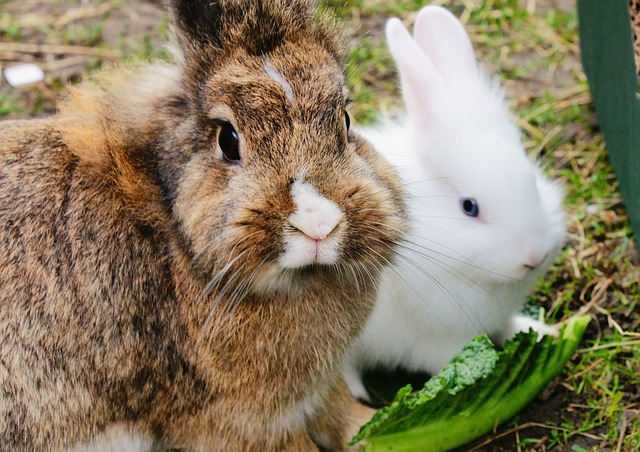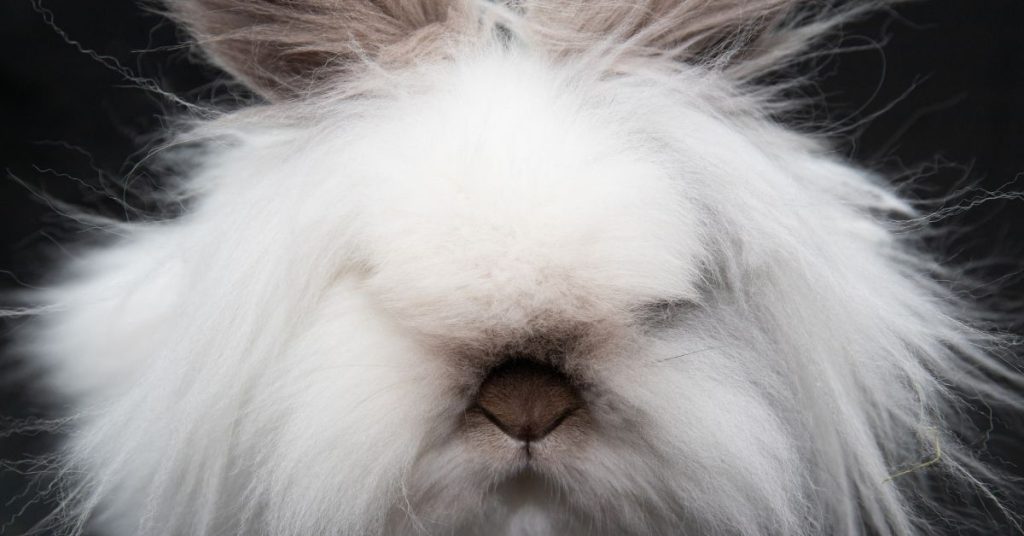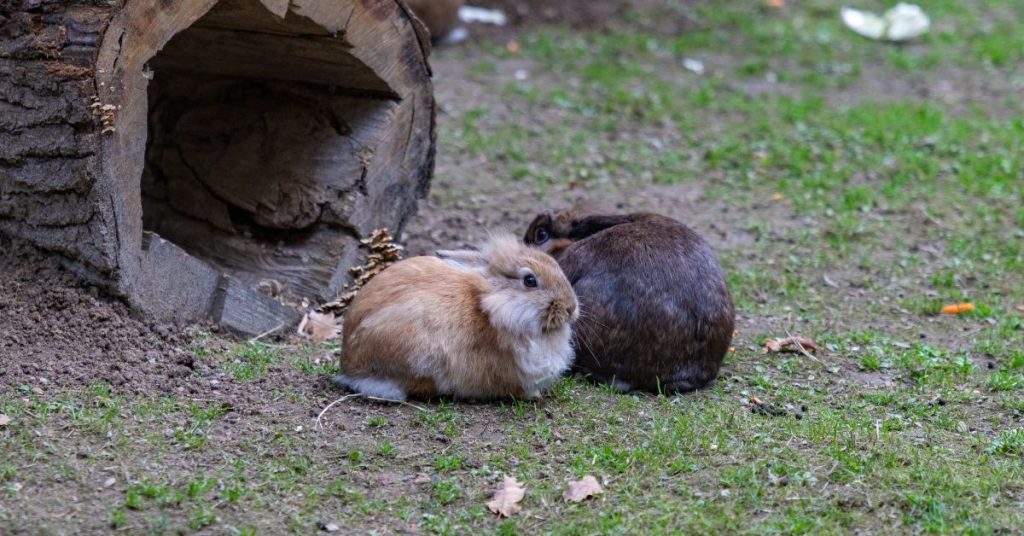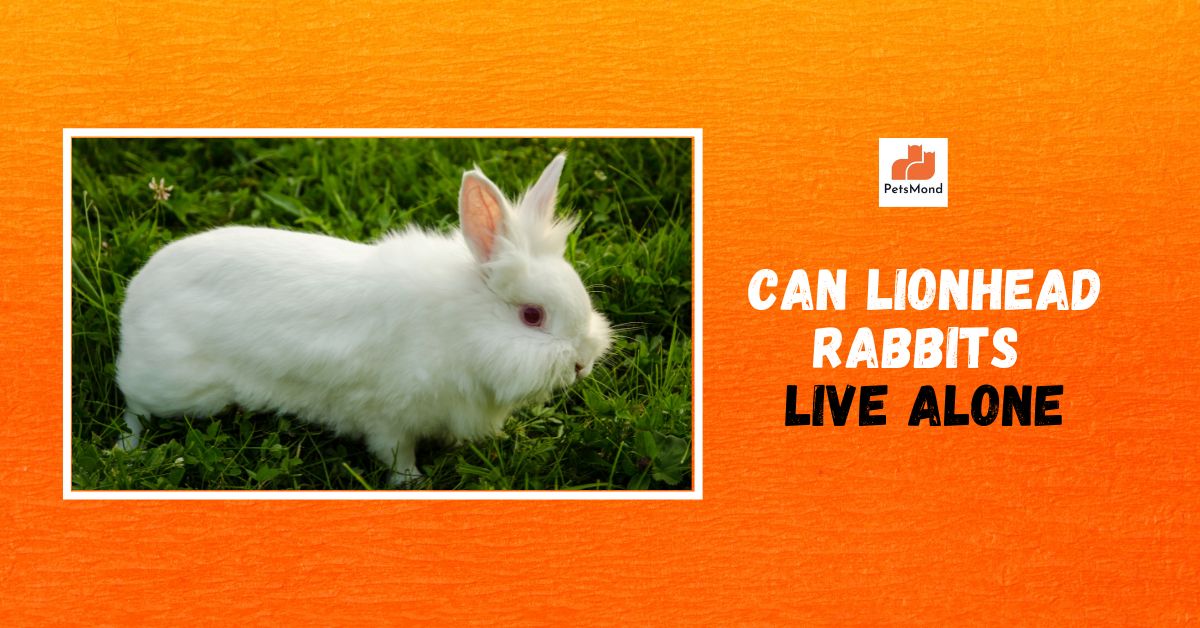There’s a common misconception about raising rabbits. Whether you visit a shop or a shelter, you’re always encouraged to get a pair of lionhead rabbits instead of one. This results in doubt if lionhead rabbits can live alone or not. I’ve been raising rabbits for over a decade, and I know the perfect answer for you.
Lionhead rabbits can live alone, provided they’re equipped with human interaction or toys. Otherwise, living with companions is highly encouraged as they’re social, energetic, and expect regular mental stimulation to stay happy.
In this article, we shall look at everything about raising lionhead rabbits (one or two). Here’s a quick glimpse of this article.
- One vs. two lionhead rabbits
- Pros and cons of lionhead rabbits living alone
- Signs of loneliness
- How to maintain multiple lionhead rabbits
- Common mistakes while housing multiple rabbits together
Let’s get started!
Keeping One Or Two Lionhead Rabbits: Which Is Better

While it is possible for a Lionhead rabbit to live alone, it isn’t recommended. Lionhead rabbits are social creatures by nature and crave interaction with other rabbits, even if they don’t necessarily get along well.
If kept alone, the rabbit will suffer from loneliness, boredom, and an overall lack of stimulation. As such, their owners must pay extra attention to them to make sure they stay happy and healthy. This may include providing them with interactive toys or scheduling playdates with other rabbits so that they remain active and engaged mentally.
When it comes to living arrangements for Lionhead rabbits, the ideal situation is for them to live in pairs or small groups of 3-4 compatible individuals. This gives them the opportunity to interact socially and form a bond with each other.
A properly sized enclosure should also be provided where the group can explore and socialize safely. It’s important that enough room is available for all of the rabbits, as overcrowding can lead to increased levels of stress and aggression within the group.
Another factor to consider is that Lionhead rabbits are very active animals and require regular exercise in order to stay healthy and fit. When living in a pair or small group setting, they will often run around together, which helps promote physical activity as well as mental stimulation.
I’ve had single rabbit for 7+ years and he has always been relying on human’s presence during initial years. Over time, he was quite independent and more lively than usual.
However, this doesn’t mean that single rabbits can’t be active; they just need more encouragement from their caregivers in order to do so, which can come in the form of interactive toys or games that focus on stimulating their natural curiosity.
How Much Space Does A Lionhead Rabbit Need
A lionhead rabbit needs at least 4-6 sqft and needs a cage of the dimensions: 30x30x24. As you add more rabbits, these values should increase automatically.
As they weigh around 2.5-3.5 pounds, they don’t require much space. However, for regular physical and mental stimulation, they need a minimum space of 4-6 sqft, in addition to ample space to play and run around.
Also read: How much space do angora rabbits need?
Pros and Cons of Keeping Lionhead Rabbits Alone

Lionhead rabbits are social creatures that require companionship in some form. If you’re thinking of keeping lionhead rabbits alone, here are the pros and cons.
Pros:
- They are very low-maintenance pets and can be kept as a single rabbit which reduces the amount of care they need.
- It is less expensive to keep a single rabbit than two, eliminating the need for extra food and supplies.
- If a bunny is kept alone, there’s no need to compete for attention or resources with another rabbit.
- Solo rabbits are generally more docile and calmer than those in pairs, making them ideal pets for children or first-time owners.
- Lionhead rabbits can form strong bonds with their owners and can be incredibly affectionate when given the chance.
Cons:
- If a lionhead rabbit is kept as a single animal, he can become bored quickly and may develop undesirable behaviors such as digging or chewing on furniture.
- A solitary bunny may start to display signs of loneliness without the companionship of another rabbit which can lead to depression and loss of appetite.
- Without the presence of another rabbit, a lionhead bunny may become territorial and aggressive with its human companions.
- Keeping a single rabbit can be difficult to keep away from other animals in the household or visitors that may cause stress to the rabbit.
- A solitary lionhead rabbit will not have the opportunity for social interaction with other rabbits and may struggle to express its natural playfulness.
- Due to their need for companionship, a single rabbit will likely require more attention from their owner(s) than two bunnies would.
The Importance of Social Interaction for Lionhead Rabbits
Lionhead rabbits need social interaction to stay healthy and happy. They are naturally social animals, which means they prefer the company of other rabbits or people. Without proper socialization, a Lionhead Rabbit can become anxious and stressed, leading to behavioral problems such as biting.
Socializing a rabbit should begin early in their life so that they can learn proper behaviors, when to be active or quiet, and how to interact with other animals. It is important to introduce them to a variety of people so that they get used to interacting with unfamiliar faces as well. This will help them feel more comfortable in new situations.
Socializing your Lionhead Rabbit is key for their development. Providing your rabbit with daily interaction helps to minimize boredom, stress, and anxiety. Socializing rabbits can take many forms, such as providing them with plenty of toys, playing games with them, or simply spending time talking to them.
Alternatives to Keeping a Single Lionhead Rabbit

If you’re considering getting a pet rabbit but aren’t sure if a single Lionhead is a right choice for you, there are several alternatives that may be more suitable.
One option is to get multiple rabbits and keep them as a group. This can be a great way to ensure your pets remain socialized and active, as well as provide companionship. When getting multiple rabbits, it’s important to ensure they are all spayed or neutered in order to reduce the potential for arguments and fighting within the group.
Another alternative to a single Lionhead rabbit is adopting an adult rabbit from a shelter or rescue organization. Adult rabbits typically have better personalities than younger rabbits, and they often need homes even more than kittens or puppies. Since adult rabbits have already been spayed or neutered and their personalities are established, the transition to their new home can be less stressful for them.
Signs of Loneliness in Lionhead Rabbits
Signs of loneliness in Lionhead rabbits include decreased activity levels, lack of enthusiasm when usually excited to see people, loss of appetite, and depression-like symptoms such as hiding away from their owners and refusing physical interaction.
They may also start to overgroom themselves or display aggressive behavior when someone approaches them, as they become fearful of humans after not interacting with them for extended periods.
Another sign of loneliness in Lionhead rabbits is that they will begin to vocalize more often, whether through loud thumping, screeching, or even making a chattering sound with their teeth. They can become anxious and start to pace around the cage or hutch, looking for something or someone to interact with.
How to Introduce a New Companion to Your Lionhead Rabbit
When introducing a new companion to your lionhead rabbit, it’s important to take your time and be patient.
Step 1:
Start by allowing the rabbits to get used to each other’s scent. Place one of the rabbits in a carrier or enclosure and let the other rabbit sniff around and explore. You can also place blankets that have been touched by each rabbit in the same space, so they can get used to one another’s scent.
Step 2:
Once your rabbits are comfortable with each other’s smell, you can introduce them face-to-face. Make sure both rabbits have plenty of space and time to explore each other at their own pace, without feeling threatened or overwhelmed. If either rabbit appears to be scared or aggressive, move them away from each other for a few minutes, then reintroduce them.
Step 3:
If the rabbits are comfortable with each other’s presence after several supervised meetings, you can let them explore outside of their enclosure together. Make sure to always supervise them while they’re interacting together, and keep an eye out for any signs of aggression or fear.
Note:
It’s important to remember that every rabbit is different, and the introduction process may take longer with some rabbits than with others.
Be patient and keep introducing them in short, supervised sessions until they are comfortable around each other. With time and patience, you should be able to successfully introduce a new companion to your lionhead rabbit.
Tips for Keeping Multiple Lionhead Rabbits
Maintaining multiple lionhead rabbits can be a tiresome task. If you’re new to this commitment, here are a few tips to keep them hale and healthy without worrying yourself much.
1. Ensure that each lionhead rabbit has their own housing unit. Lionheads are social animals that need plenty of space to move around, so give them as much room as possible in their cage.
2. Keep the cages clean and free from odors or bacteria by regularly cleaning out any droppings and fur.
3. Make sure to supply each cage with fresh vegetables, hay, and water on a regular basis to ensure their dietary needs are met. Provide plenty of bedding material in each cage, such as hay or straw, to ensure the rabbits have a comfortable place to rest and sleep.
4. Allow them time out of their cages to roam and explore in a safe environment. Monitor the rabbits while they are out of their cages to make sure they stay safe and don’t get into any trouble.
5. Make sure the cage is placed away from direct sunlight, drafts, or other sources of extreme temperatures that could be uncomfortable for the rabbits.
6. Introduce new lionheads into the environment carefully, watching closely for signs of aggression before placing them in cages together.
Common Mistakes to Avoid When Housing Lionhead Rabbits Together
If you’re new to raising multiple lionhead rabbits together, you may commit a lot of mistakes. Here are a few possible mistakes with solutions.
1. Putting two rabbits of the same gender together: Lionhead rabbits should always be housed in pairs that are of opposite genders to avoid any aggressive or territorial behavior that can result from having two unneutered males living together.
2. Not providing enough space: Lionheads require a spacious cage environment with multiple levels, hiding spots, and plenty of room to move around.
3. Not providing enough bedding: Rabbits are susceptible to respiratory infections if they become too cold or their environment doesn’t have adequate bedding for them to burrow in. Provide your Lionhead rabbits with plenty of clean, comfortable bedding materials such as straw, hay, or wood shavings.
4. Not providing enough toys and chewables: Lionhead rabbits are active animals and need plenty of opportunities to express their natural behaviors. Provide them with an array of toys, such as tunnels, balls, ropes, and other safe chewable objects like cardboard boxes or paper towel rolls to keep them entertained.
5. Not providing enough litter box training: Lionhead rabbits are very clean animals and should have a separate area in their cage for them to use as a toilet. They must be taught how to use it properly, so make sure you regularly review the proper litter box training techniques.
6. Not providing enough enrichment activities: Lionhead rabbits should have plenty of opportunities to engage in activities, such as supervised outdoor playtime or interactive feeding puzzles. This will help keep them both mentally and physically stimulated.
7. Not providing enough grooming: Regular brushing and nail trimming are essential for keeping your Lionhead rabbit’s coat healthy and free of matted fur, as well as preventing any painful ingrown toenails.
8. Not providing enough socialization: Lionhead rabbits are very social animals, and they need plenty of time with humans that they trust in order to stay healthy and happy. Regularly interacting with your rabbits will help make them more comfortable around people and help bond the two of them.
FAQ
Can Single Rabbits Be Happy
It depends on the environment and how much love and attention the rabbit gets from human companions – lone rabbits need just as much companionship and enrichment as those who live in pairs or groups.
Of course, if handled properly and given the chance to establish bonds with their two-legged friends, single rabbits can indeed lead very happy and contented lives.
The key lies in providing them with ample environmental enrichment from toys, activities, and regular playtime to help keep their minds healthy and strong. With that being said, so long as single rabbits get the collective care required for their physical, emotional, and mental well-being, there’s no reason why they can’t enjoy fulfilling lives on their own!
Related Articles


